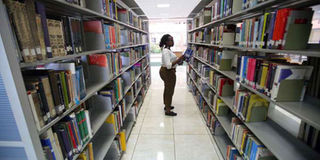Secondary school students shun libraries, says report

A student in a library. FILE PHOTO | NATION MEDIA GROUP
What you need to know:
- The report also notes that there is poor performance in national examinations in rural and new schools.
- The study was conducted across the country following poor KCSE results in 2016 and 2017.
Majority of candidates sitting for national examinations rarely go to the libraries to search for new knowledge, a report by the Kenya Union of Post Primary Education Teachers (Kuppet) has revealed.
The report dated November 2018, reveals that 60 percent of candidates for Kenya Certificate of Secondary Education (KCSE) examinations which ended Wednesday rarely go to the library and instead revise past papers killing research and innovation among the learners.
'LIFELONG SKILLS'
“The study recommends an evaluation system that gives education a holistic approach to measure lifelong skills as opposed to summative evaluation,” reads the report on Assessment of 2016-2017 KCSE performance and its social economic impact in Kenya.
It notes that objective based assessment done is stressful to the learners and unfair since it tests the child under one environment after many years of study.
Kuppet is recommending competency based study and also want quality assurance and standards officers to encourage the teachers to give all subjects the importance they deserve on the timetable in order to produce holistic learners at the end of the process.
The report also notes that there is poor performance in national examinations in rural and new schools.
“The curriculum planners and Ministry of Education are encouraged to avail sufficient resources to schools in order for them to besides producing better results, also equip learners with requisite skills to fit in and positively exploit their future environment,” reads the report.
On the 2017 KCSE, the report says, many candidates did not qualify to join the institutions due to poor results in national examinations.
“There is need for a review of university placement to match performance to reduce wastages of resources. Regarding the girl education, it will be prudent for education planners and other stakeholders to invest more in the promotion of girl child education to realize education equality,” states the report.
The study was conducted across the country following poor KCSE results in 2016 and 2017.





